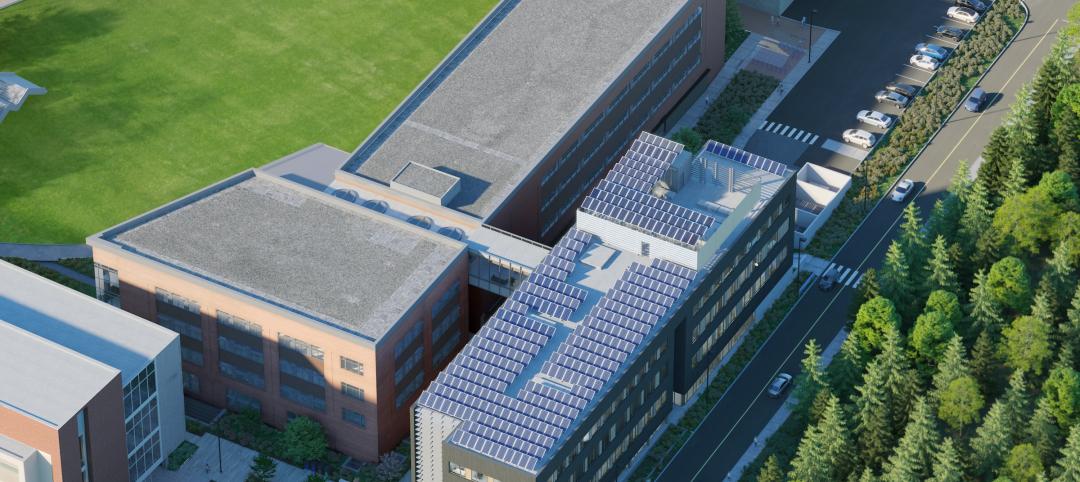The U.S. Green Building Council awarded the Joliet Junior College (JJC) Facility Services Building a LEED New Construction 2009 Gold certification – making the Facility Services Building the first of its kind on a higher education campus to receive this level of certification.
Designed by Legat Architects and built by Gilbane, the Facility Services Building’s new mechanical and electrical systems resulted in a 42% reduction in energy use and an annual savings of approximately 37% in operating costs.
Gilbane oversaw the procurement, installation and commissioning of all the LEED systems, working with contractors to ensure that they used LEED-compliant materials and submitting the documentation for all of the LEED construction-related points. The team also worked with JJC to lead a significant construction waste recycling effort.
Sustainable elements of the building include:
- Geothermal HVAC system to reduce heating and cooling loads
- Reflective roof surface to reduce heat gain
- Solar heat collectors tied to outside air intake to minimize the amount of energy used to heat the inside of the building
- Use of LED lighting in all areas of the building
- Motion sensors for lighting in occupied spaces
- Operable, high-efficiency windows to improve ventilation and bring in fresh air
- More than 75% of construction waste diverted from landfills
- Use of recycled and locally sourced materials during construction
- Low-VOC paints, adhesives, and sealants used in all spaces of the building
JJC’s Facility Services Building is part of a $220 million master plan aimed at transforming the college’s approach to sustainability and efficiency. The 42,500-square-foot facility replaces several scattered temporary buildings that previously housed the custodial, maintenance, planning/construction and roads/grounds staff at JJC. BD+C
Related Stories
Office Buildings | Jun 3, 2024
Insights for working well in a hybrid world
GBBN Principal and Interior Designer Beth Latto, NCIDQ, LEED AP, ID+C, WELL AP, share a few takeaways, insights, and lessons learned from a recent Post Occupancy Evaluation of the firm's Cincinnati, Ohio, office.
Multifamily Housing | Jun 3, 2024
Grassroots groups becoming a force in housing advocacy
A growing movement of grassroots organizing to support new housing construction is having an impact in city halls across the country. Fed up with high housing costs and the commonly hostile reception to new housing proposals, advocacy groups have sprung up in many communities to attend public meetings to speak in support of developments.
MFPRO+ News | Jun 3, 2024
New York’s office to residential conversion program draws interest from 64 owners
New York City’s Office Conversion Accelerator Program has been contacted by the owners of 64 commercial buildings interested in converting their properties to residential use.
MFPRO+ News | Jun 3, 2024
Seattle mayor wants to scale back energy code to spur more housing construction
Seattle’s mayor recently proposed that the city scale back a scheduled revamping of its building energy code to help boost housing production. The proposal would halt an update to the city’s multifamily and commercial building energy code that is scheduled to take effect later this year.
Mass Timber | May 31, 2024
Mass timber a big part of Western Washington University’s net-zero ambitions
Western Washington University, in Bellingham, Wash., 90 miles from Seattle, is in the process of expanding its ABET-accredited programs for electrical engineering, computer engineering and science, and energy science. As part of that process, the university is building Kaiser Borsari Hall, the 54,000-sf new home for those academic disciplines that will include teaching labs, research labs, classrooms, collaborative spaces, and administrative offices.
Construction Costs | May 31, 2024
Despite challenges, 2024 construction material prices continue to stabilize
Gordian’s Q2 2024 Quarterly Construction Cost Insights Report indicates that supply chain issues notwithstanding, many commodities are exhibiting price normalization.
University Buildings | May 30, 2024
Washington University School of Medicine opens one of the world’s largest neuroscience research buildings
In St. Louis’ Cortex Innovation District, Washington University School of Medicine recently opened its new Jeffrey T. Fort Neuroscience Research Building. Designed by CannonDesign and Perkins&Will, the 11-story, 609,000-sf facility is one of the largest neuroscience buildings in the world.
Architects | May 30, 2024
AE firm Goodwyn Mills Cawood merges with Southland Engineering
Architecture and engineering firm Goodwyn Mills Cawood (GMC) is further expanding its services through a strategic merger with engineering firm Southland Engineering in Cartersville, Ga.
K-12 Schools | May 30, 2024
Inclusive design strategies to transform learning spaces
Students with disabilities and those experiencing mental health and behavioral conditions represent a group of the most vulnerable students at risk for failing to connect educationally and socially. Educators and school districts are struggling to accommodate all of these nuanced and, at times, overlapping conditions.
MFPRO+ New Projects | May 29, 2024
Two San Francisco multifamily high rises install onsite water recycling systems
Two high-rise apartment buildings in San Francisco have installed onsite water recycling systems that will reuse a total of 3.9 million gallons of wastewater annually. The recycled water will be used for toilet flushing, cooling towers, and landscape irrigation to significantly reduce water usage in both buildings.

















